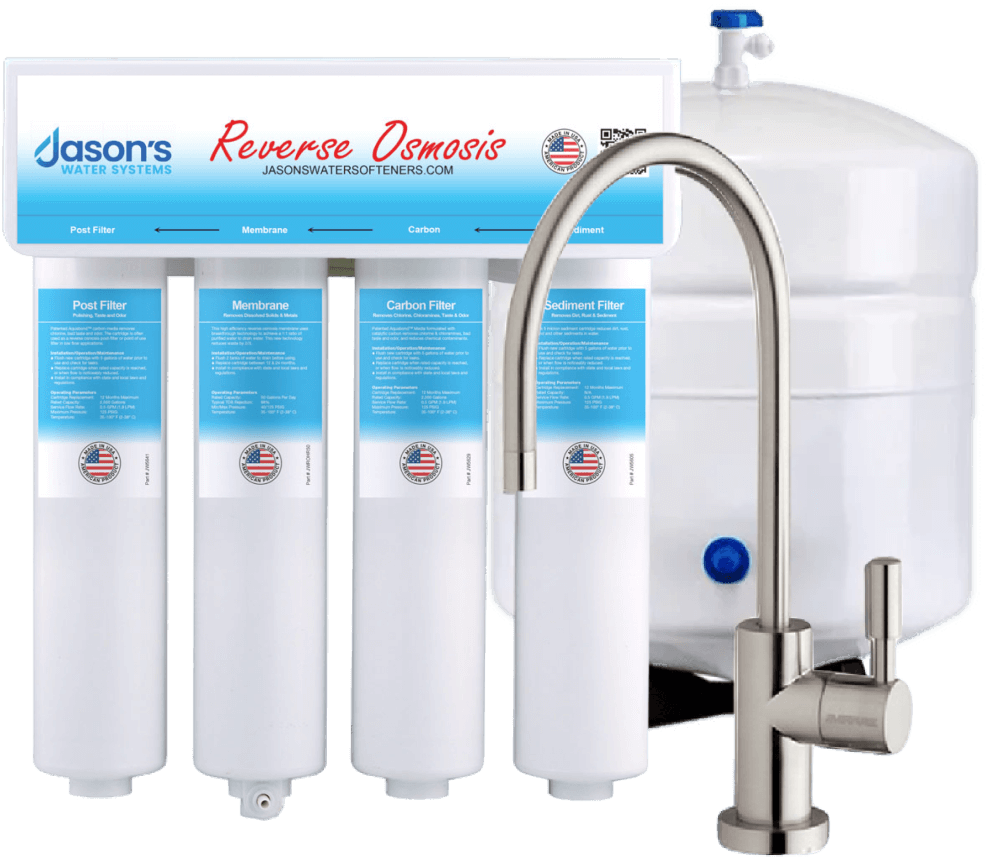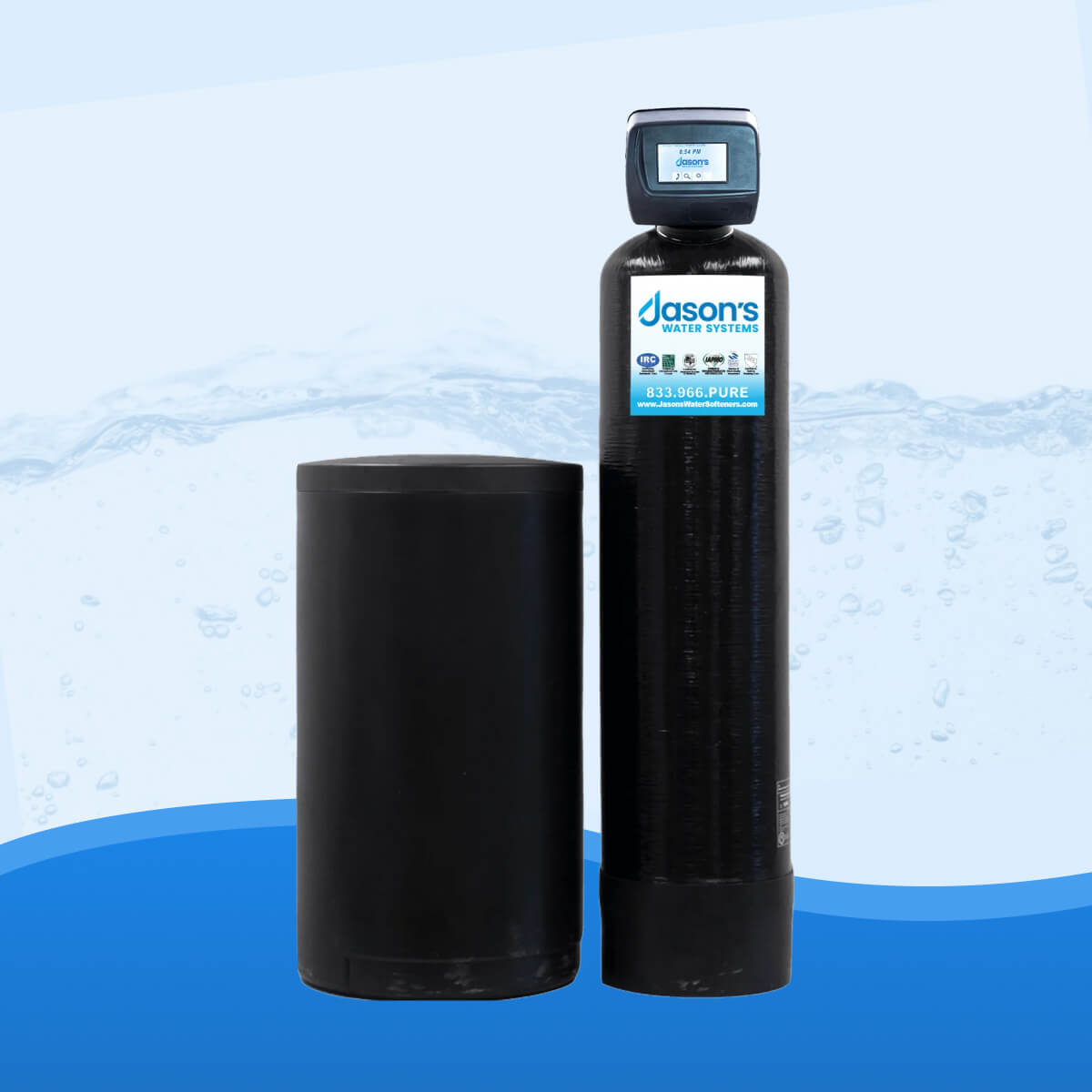.png)
What is Hard Water?
Water: it's essential for life, fundamental for hygiene, and is a luxury many of us often take for granted. But what if the water flowing through your taps isn't as pure and effective as you think? One of the most common water conditions affecting households, especially in many parts of Texas, is hard water. But what exactly is hard water, and why does it matter? In this post from the Jason’s Water Systems blog, we’ll break down all there is to know about hard water, how it affects your home, how it affects your person, and what you can do to mitigate it.
The Science of Hard Water
Water, in its purest form, is a colorless, tasteless, and odorless liquid. However, it's a universal solvent, meaning it can dissolve more substances than any other liquid. This unique capability, combined with its ubiquity, means it’s rarely found in its pure state in nature. As it journeys through the earth's surface, it interacts with various minerals, soils, and rocks, leading to the absorption of a wide array of elements and compounds.
How Does Water Become Hard?
The journey of rainwater, from the clouds to our taps, is an intricate dance with the environment. Once rainwater hits the ground, it starts percolating through the soil and underlying rock layers. In regions with limestone, chalk, or gypsum, which are primarily made up of calcium and magnesium carbonates, bicarbonates, and sulfates, the water begins to absorb these minerals. This absorption results in a higher concentration of calcium and magnesium ions in the water, rendering it 'hard'.
Mineral Breakdown
- Calcium (Ca^2+): Often sourced from limestone or gypsum, calcium gives water a slightly tangy or metallic taste. It's responsible for the formation of scale in pipes and water heaters.
- Magnesium (Mg^2+): Found in various rock formations, magnesium is often associated with calcium in making water hard. In large amounts, it can give water a bitter taste.
Apart from these two primary culprits, hard water might contain traces of other minerals such as iron, manganese, and strontium. At Jason’s Water Systems, we offer FREE water tests to let homeowners know exactly what’s in their water.
Why Doesn’t Rainwater Have These Minerals?
Rainwater is naturally soft. The process of evaporation and condensation leaves the majority of minerals behind. However, as mentioned earlier, as rainwater flows through the ground, it becomes mineral-laden, picking up calcium, magnesium, and other ions from the earth.
Hard Water and pH
One might wonder if hard water is also alkaline because of the minerals. While it's true that dissolved calcium and magnesium can raise the pH of water, making it more alkaline, the hardness and pH are independent factors. Water can be hard but slightly acidic, especially if it has other dissolved substances affecting its pH.
Grading Water Hardness
Water hardness varies and is typically measured in grains per gallon (gpg) or milligrams per liter (mg/L). The higher these numbers, the harder the water.
0-60 mg/L (Soft): Water in this range is generally considered soft.
- 61-120 mg/L (Moderate): Signs of hard water start to show, especially in appliances and fixtures.
- 121-180 mg/L (Hard): This is where you'll start to notice the impacts more evidently, with limescale buildup and reduced soap lathering. Hard water is when you’ll also start to feel physical discomfort with dry skin or hair, and clothing that isn’t soft after a wash.
- Over 180 mg/L (Very Hard): At this stage, untreated water can lead to significant household challenges. In most cases, households with very hard water will notice this at almost every turn and in every aspect. Spots on dishes, mirrors, and shower doors, very dry skin and hair, and problems with appliances are plentiful when water is considered very hard.
Discover the hardness of the water in various Texas cities with this post from Jason’s Water Systems blog.
Understanding The Issues Caused By Hard Water
Water is a vital aspect of our daily lives, impacting everything from our hygiene to the efficiency of household appliances. When water is 'hard,' or mineral-laden, it can manifest a slew of issues that, over time, can prove cumbersome and costly.
Reduced Soap Efficiency
Lathering Issues
Hard water minerals react with soaps and detergents, leading to reduced lathering. This means you might end up using more soap than required, which isn't cost-effective and can leave a residue.
Soap Scum
The combination of hard water and soap results in the formation of 'soap scum' - a filmy layer that can coat bathtubs, shower walls, and even your skin. This not only makes cleaning more challenging but can also lead to blocked pores on the skin. Learn more about how hard water impacts showers here.
Mineral Build-up
Limescale
This white, chalky deposit can accumulate in kettles, coffee makers, and especially in the heating elements of water heaters, reducing their efficiency.
Pipe Clogging
Over time, mineral deposits can narrow the diameter of pipes, reducing water flow, and even leading to blockages. This can put undue stress on your plumbing system and may eventually require expensive repairs or replacements.
Appliance Issues
Mineral build-up can also negatively affect water-using fixtures or appliances, such as toilets and dishwashers. Learn how hard water affects toilets here, and how hard water affects dishwashers here.
Staining
Fixtures and Surfaces
Faucets, tiles, and glasses can develop stubborn, cloudy stains that are hard to remove. These stains can deteriorate the aesthetics of bathrooms and kitchens.
Laundry
Hard water can cause whites to turn gray and colors to fade, reducing the lifespan of clothes. Moreover, clothes might feel scratchy and stiff after washing.
Skin and Hair Concerns
Dry Skin
The mineral deposits can strip the skin of its natural oils, making it feel dry and sometimes itchy.
Dull Hair
Hard water can leave a residue on hair, making it feel rough, dull, and harder to manage. It can also exacerbate certain scalp conditions like dandruff.
Higher Energy Bills
Reduced Appliance Efficiency
Hard water can decrease the efficacy of water heaters. When minerals accumulate on heating elements, the appliance consumes more energy to heat the same amount of water, leading to higher energy bills.
Shortened Appliance Lifespan
Appliances like dishwashers, washing machines, and water heaters tend to have shorter lifespans when constantly processing hard water.
Environmental Impact
Increased Detergent Usage
Since hard water reduces lathering, households often use more detergent, leading to more chemicals being released into wastewater systems and the environment.
Resource Drain
Replacing or repairing appliances and plumbing systems prematurely due to hard water effects contributes to increased waste and resource usage.
Taste and Odor
Metallic Taste
A high concentration of minerals might impart a metallic or off-putting taste to the water.
Odor Issues
In some cases, hard water can have a distinct smell, especially if it contains additional minerals like iron.
Addressing the concerns of hard water isn't just about maintaining the longevity of appliances or ensuring efficient soap usage; it's about enhancing the overall quality of daily life. As different regions grapple with varying degrees of water hardness, understanding these concerns helps homeowners take proactive measures for a smoother, more sustainable household experience. One of the best decisions a homeowner can make is to invest in a water softener, especially in hard water areas like Central Texas.
How Water Softeners Combat Hard Water
Water softening is a crucial process for households plagued by the challenges of hard water. At the heart of this solution is the technology within water softeners, designed to eliminate the adverse effects of mineral-laden water. Here's a breakdown of how water softeners, particularly the advanced systems from Jason's Water Systems, tackle hard water effectively.
The Fundamental Mechanism
Water softeners primarily function on the principle of ion exchange. Hard water contains minerals like calcium and magnesium ions. These ions are responsible for the hard water's negative effects. Water softeners contain resin beads charged with sodium ions. As hard water flows over these resin beads, the calcium and magnesium ions are swapped for sodium ions, rendering the water 'soft.'
Benefits of Softened Water
Once the water is softened, you'll immediately notice an improvement in its quality. Soaps and detergents will lather better, there will be no more mineral deposits or limescale on appliances, your skin and hair will feel softer, and you'll prevent potential long-term damage to your plumbing.
Multistage Softening and Filtration System
Jason’s Water Systems boasts a holistic approach to water treatment with its multistage process:
Stage 1: Filtration with Coconut Shell Carbon
Starting the process is the coconut shell carbon, a premium filtering agent. Its primary function is to diminish chlorine smells and tastes, which are common in municipal water supplies. Beyond chlorine, it's adept at reducing a myriad of other toxic chemicals. This pre-filtration extends the life of our system, making it last four times longer than many national competitors.
Stage 2: Softening with Fine Mesh Resin
At the heart of our system is the softening stage. Our fine mesh resin is specifically designed to trap and eliminate minerals responsible for hard water, such as calcium and magnesium. By doing so, it combats the common issues of soap scum, leading to healthier skin, lustrous hair, and ensuring the longevity of household appliances.
Stage 3: Polishing with Crushed Garnet Media
After softening, the water undergoes a polishing stage using crushed garnet media. This stage is crucial for aesthetic reasons as it eradicates any discoloration and turbidity, ensuring that the water flowing from your taps is crystal clear.
Regular Regeneration
One essential aspect of water softeners is their regeneration process. Over time, the resin beads get saturated with calcium and magnesium ions. Thus, they need to be recharged with sodium ions. Modern systems, like Jason’s Water Systems, have automated this process, ensuring that the resin beads are regenerated periodically and the system remains effective over time.
For All Things Water Quality in The State of Texas, Trust Jason’s Water Systems
Water is the lifeblood of our homes, playing a vital role in everything from our daily hygiene routines to the efficient operation of our household appliances. Hard water, while often overlooked, can substantially impact the quality of our lives in subtle yet profound ways. Recognizing the challenges posed by hard water and taking proactive steps, such as investing in a state-of-the-art water softening system like those offered by Jason’s Water Systems, can dramatically transform your home environment.
With the multi-stage softening and filtration process, homeowners can enjoy not just softer water but a range of benefits that improve daily living — from softer hair and healthier skin to longer-lasting appliances and reduced energy costs. In essence, addressing hard water isn't merely a luxury; it's an essential step toward a better, more sustainable household experience. So, next time you pour a glass of water from your tap or take that refreshing shower, remember the significance of the water quality and the peace of mind a reliable water softener can bring. If that glass of water isn’t delicious and crystal clear, contact us for a FREE water test to see what’s in your water!










